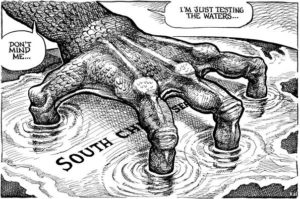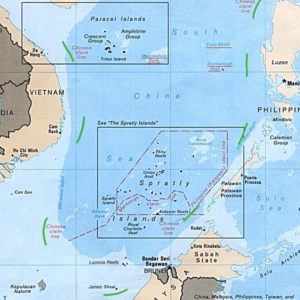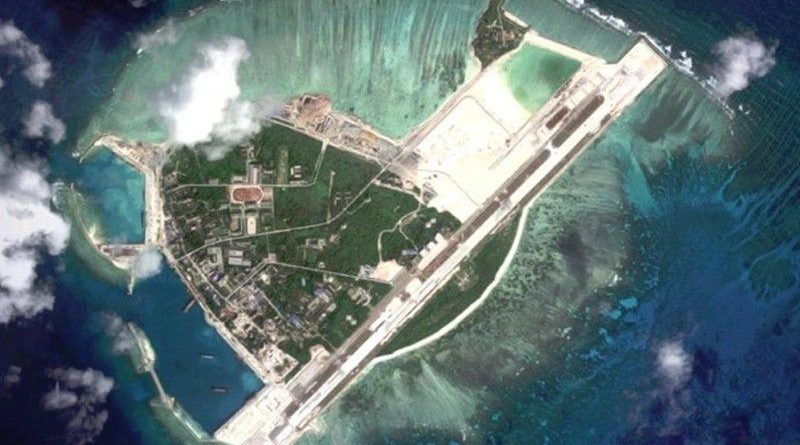HEADLINE: CHINA’S 9-LINE: MANILA, Philippines — Philippines hits coercive use of militias, coast guard in South China Sea
In a joint statement at the end of the 5th Philippines-Australia Ministerial Meeting on Monday, Foreign Affairs Secretary Teodoro Locsin Jr., Australian Foreign Minister Marise Payne, Trade Secretary Ramon Lopez and his counterpart Trade Minister Dan Tehan cited the significance of the ministerial meeting as a strategic dialogue to chart the direction and vision of bilateral relations under the framework of the 2015 Joint Declaration on the Comprehensive Partnership between the two countries.


MANILA, Philippines — The Philippines and Australia have expressed serious concern over the “dangerous and coercive” use of coast guard vessels and maritime militias in the South China Sea and the continuing militarization of disputed features.
In a joint statement at the end of the 5th Philippines-Australia Ministerial Meeting on Monday, Foreign Affairs Secretary Teodoro Locsin Jr., Australian Foreign Minister Marise Payne, Trade Secretary Ramon Lopez and his counterpart Trade Minister Dan Tehan cited the significance of the ministerial meeting as a strategic dialogue to chart the direction and vision of bilateral relations under the framework of the 2015 Joint Declaration on the Comprehensive Partnership between the two countries.
“The ministers and secretaries expressed serious concern about the continuing militarization of disputed features in the South China Sea, the dangerous and coercive use of coast guard vessels and maritime militias and efforts to disrupt other countries’ resource exploitation activities,” the statement read.
“They emphasized that the actions of a state’s coast guard, and its associated legal frameworks, must be consistent with international law,” it read.
The ministers and secretaries reiterated the importance of freedom of navigation and overflight and that all disputes should be resolved peacefully in accordance with international law, including the 1982 United National Convention on the Law of the Sea (UNCLOS).
They noted the fifth anniversary of the 2016 South China Sea Arbitration Award and reaffirmed that it is final and legally binding on the parties to the dispute.
The ministers and secretaries also called for any Code of Conduct in the South China Sea “to be fully consistent with international law, in particular UNCLOS, not prejudice the interests of third parties or the rights of states under international law and support existing inclusive regional architecture.”
On July 23, 2020, Australia sent a note verbale to the United Nations rejecting China’s claims in the South China Sea. It stated, among others, that the “Australian Government… disputes China’s claim that it is not bound by the arbitral award… The Tribunal’s decision is final and binding on both parties to the dispute.”
The ministers and secretaries engaged in an exchange of views on a range of regional strategic issues, including maritime security, as they reaffirmed their shared aspiration for a maritime domain that is peaceful, stable and secure.
They noted the importance of ongoing cooperation on maritime security and welcomed new initiatives to expand cooperation on maritime issues, including the establishment of a Philippines-Australia Maritime Dialogue mechanism this year.
The ministers and secretaries agreed that the two nations would continue to work closely to implement their commitments to uphold human rights through dialogue and constructive engagement.
Particular reference was made to the 45th session of the Human Rights Council in October 2020 where Australia co-sponsored an Icelandic and Philippine joint resolution seeking technical assistance and capacity building for the promotion and protection of human rights in the Philippines.
The Philippines also conveyed that the UN Joint Program on Human Rights had been finalized and launched in July 2021. The program aims to enhance the capacity of national institutions and strengthen the Philippines’ compliance with its international human rights obligations.
Sustained patrols
Meanwhile, Defense Secretary Delfin Lorenzana reaffirmed yesterday that the military and other relevant government agencies are continuously patrolling the West Philippine Sea.
“It’s now quiet there… There’s nothing unusual happening in the area,” Lorenzana said in Filipino during an interview with SMNI news when asked about the current situation and problem with Chinese vessels within the country’s exclusive economic zone (EEZ).
“We are regularly patroling the area – air and naval patrols… and the coast guard is also patroling there, protecting our fishermen,” he said.
Lorenzana said the Bureau of Fisheries and Aquatic Resources also has big ships continuously roaming in the West Philippine Sea.
He noted that such patrols seek to assure the public that the Philippines has presence in the in the West Philippine Sea, giving Filipino fishermen a sense of confidence or security within the country’s EEZ.
India, Phl naval partnership
Yesterday, two Indian Navy ships, the INS Ranvijay (Guided Missile Destroyer, D55) and INS Kora (Guided Missile Corvette, P61) and the Philippine Navy’s BRP Antonio Luna (Frigate, FF 151) conducted a joint maritime exercise in the in the West Philippine Sea.
The exercise included several operational maneuvers at sea, and both navies were satisfied with the consolidation of interoperability.
The Indian Navy ships are currently deployed to four ASEAN countries – Malaysia, Vietnam, Philippines and Singapore – in a bid to strengthen maritime security collaboration with partner nations.
In compliance with pandemic guidelines, the exercise was conducted in contactless manner and all necessary health and safety protocols were strictly observed. After the exercise, the Indian naval ships are scheduled to call at Manila Port for replenishment.
India and the Philippines share a robust defense and security partnership built over the years and spanning domains.
Both navies remain committed to further strengthening bilateral collaboration to ensure a stable, peaceful and prosperous Indo-Pacific. – Michael Punongbayan












